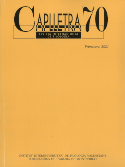The emotional aesthetics of transformation. A Baroque reexamination of Apollo and Daphne’s fable
DOI:
https://doi.org/10.7203/caplletra.70.19996Keywords:
Baroque literature, modern Catalan literature, Francesc Fontanella, reception of Garcilaso de la Vega, elegiac poetry, comparative literature, mythology Abstract
Abstract
The well-known Sonnet XIII by Garcilaso de la Vega «A Dafne ya los brazos le crecían» was to establish the disconsolate figure of Apollo, pining for the loss of Daphne, as the literary paradigm of the pangs of love —at least in Renaissance literature in the Iberian peninsula. Thus, a century later, Francesc Fontanella revisited the Garcilaso sonnet and carried out a profoundly Baroque re-reading. The Catalan text ‘transforms’ the symmetry and order in which the Spanish sonnet describes the metamorphosis of the nymph into an inseparable amalgam between the old way of being and the new reality, between the human and the plant, and freezes the figure in mutation: neither the original form nor the results of the process are as interesting as the mutation itself, an idea that conforms to Baroque sensitivities of the aesthetics of transformation. At the same time, the essentially sensory terms of the Renaissance text are transmuted, in the Catalan sonnet, into emotional, human characteristics; the Baroque poet emphasizes Daphne’s intentionality regarding her (almost self-)transformation, and attributes to her an extraordinary willfulness, contrary to Apollo, which is, in the end, to no avail. Finally, Fontanella’s elegiac text breaks with the secular expectations typical of Renaissance sonnets as an emblem of love’s misfortune and instead, rises above them based on the literaturization of the biographical experience.
 Downloads
Downloads
Downloads
Published
How to Cite
-
Abstract654
-
PDF (Català)458
Issue
Section
License
Authors submitting work to Caplletra for publication must be the legitimate holder of the usage rights. Legitimacy for the purposes of publishing the work must also include images, tables, diagrams and any other materials that may complement the text, whether they are the author of such material or not.
Copyright: on publishing their work in the journal, the author grants Caplletra. Revista Internacional de Filologia usage rights (reproduction, distribution and public communication) for both the paper printed version and for the electronic version.
All work published in Caplletra is covered by the Creative Commons license type Attribution-NonCommercial-NoDerivatives 4.0 (CC BY-NC-ND 4.0).
RESPONSABILITY
Caplletra. Revista Internacional de Filologia does not necessarily identify with the points of view expressed in the papers it publishes.
Caplletra. Revista Internacional de Filologia accepts no responsibility whatsoever for any eventual infringement of intellectual property rights on the part of authors.






